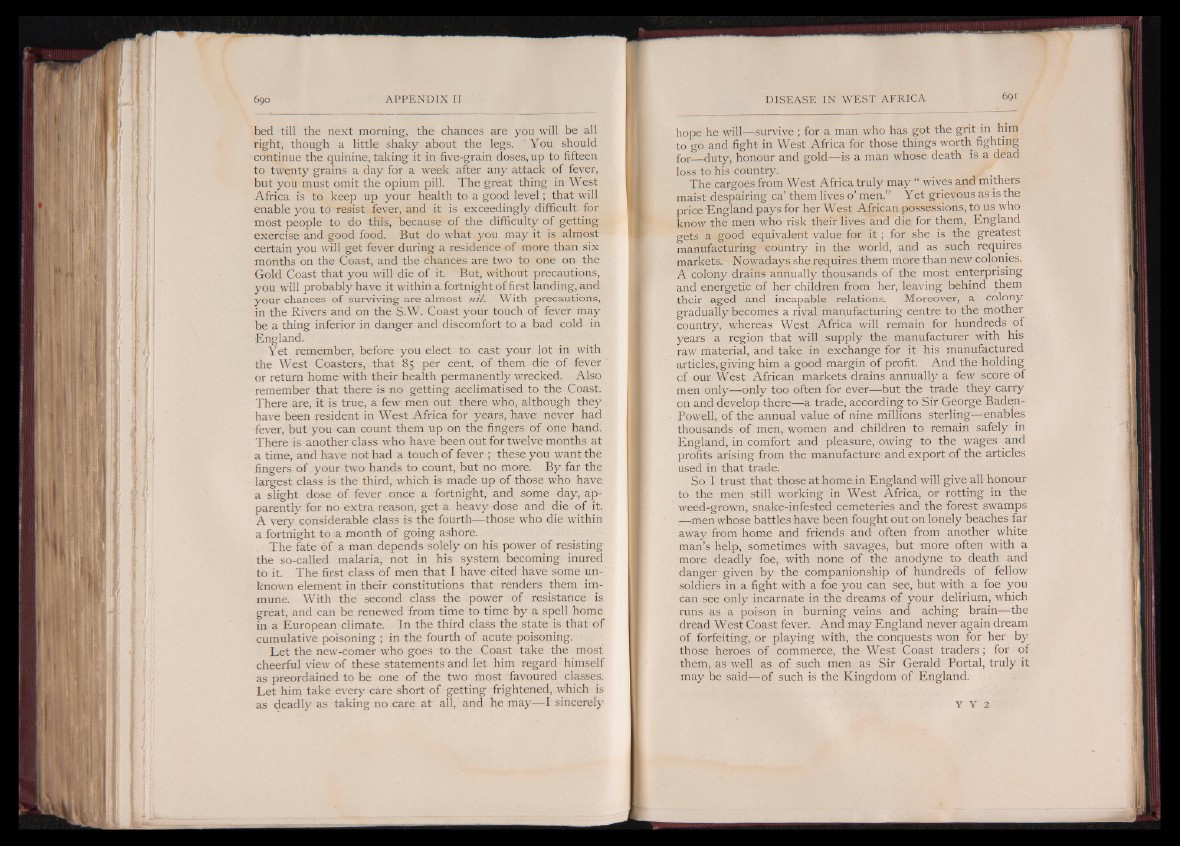
bed till the next morning, the chances are you will be all
right, though a little shaky about the legs. You should
continue the quinine, taking it in five-grain doses, up to fifteen
to twenty grains a day for a week after any attack of fever,
but you must omit the opium pill. The great thing in West
Africa is to keep up your health to a good level; that will
enable you to resist fever, and it is exceedingly difficult for
most people to. do this, because of the difficulty of getting
exercise and good food. But do what you may it is almost
certain you will get fever during a residence of more than six
months on the Coast, and the chances are two to one on the
Gold Coast that you will die of it. But, without precautions,
you will probably have it within a fortnight of first landing, and
your chances of surviving are almost nil. With precautions,
in the Rivers and on the S.W. Coast your touch of fever may
be a thing inferior in danger and discomfort to a bad cold in
England.
Yet remember, before you elect to cast your lot in with
the West Coasters, that 85 per cent, of them die of fever
or return home with their health permanently wrecked. Also
remember that there is no getting acclimatised to the Coast.
There are, it is true, a few men out there who, although they
have been resident in West Africa for years, have never had
fever, but you can count them up on the fingers of one hand.
There is another class who have been out for twelve months at
a time, and have not had a touch of fever ; these you want the
fingers of your two hands to count, but no more. By far the
largest class is the third, which is made up of those who have
a slight dose of fever once a fortnight, and some day, apparently
for no extra reason, get a heavy dose and die of it.
A very considerable class is the fourth— those who die within
a fortnight to a month of going ashore.
The fete of a man depends solely on his power of resisting
the so-called malaria, not in his system becoming inured
to it. The first class of men that I have cited have some unknown
element in their constitutions that renders them immune.
With the second class the power of resistance is
great, and can be renewed from time to time by a spell home
in a European climate. In the third class the state is that of
cumulative poisoning ; in the fourth of acute poisoning.
Let the new-comer who goes to the Coast take the most
cheerful view of these statements and let him regard himself
as preordained to be one of the two most favoured classes.
Let him take every care short of getting frightened, which is
as deadly as taking no care at all, and he may— I sincerely
hope he will— survive; for a man who has got the grit in him
to go and fight in West Africa for those things worth fighting
for— duty, honour and gold— is a man whose death is a dead
loss to his country. .
The cargoes from West Africa truly may “ wives and mithers
maist despairing ca’ them lives o’ men.” Yet grievous as is the
price England pays for her West African possessions, to us who
know the men who risk their lives and die for them, England
gets a good equivalent value for i t ; for she is the greatest
manufacturing country in the world, and as such requires
markets. Nowadays she requires them more than new colonies.
A colony drains annually thousands of the most enterprising
and energetic of her children from her, leaving behind them
their aged and incapable relations. Moreover, a colony
gradually becomes a rival manufacturing centre to the mother
country, whereas West Africa will remain for hundreds of
years a region that will supply the manufacturer with his
raw material, and take in exchange for it his manufactured
articles, giving him a good margin of profit. And the holding
of our West African markets drains annually a few score of
men only— only too often for ever— but the trade they carry
on and develop there— a trade, according to Sir George Baden-
Powell, of the annual value of nine millions sterling— enables
thousands of men, women and children to remain safely in
England, in comfort and pleasure, owing to the wages and
profits arising from the manufacture and export of the articles
used in that trade.
So I trust that those at home in England will give all honour
to the men still working in West Africa, or rotting in the
weed-grown, snake-infested cemeteries and the forest swamps
— men whose battles have been fought out on lonely beaches far
away from home and friends and often from another white
man’s help, sometimes with savages, but more often with a
more deadly foe, with none of the anodyne to death and
danger given by the companionship of hundreds of fellow
soldiers in a fight with a foe you can see, but with a foe you
can see only incarnate in the dreams of your delirium, which
runs as a poison in burning veins and aching brain— the
dread West Coast fever. And may England never again dream
of forfeiting, or playing with, the conquests won for her by
those heroes of commerce, the West Coast traders; for of
them, as well as of such men as Sir Gerald Portal, truly it
may be said— of such is the Kingdom of England.